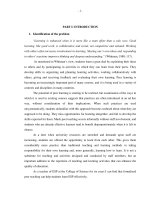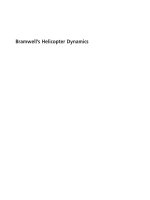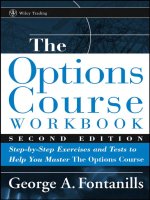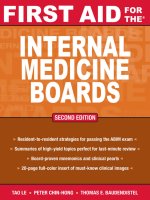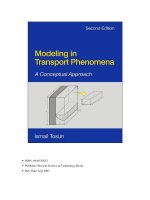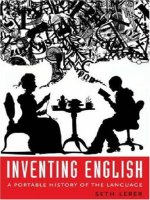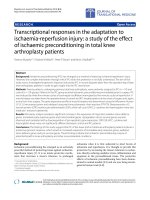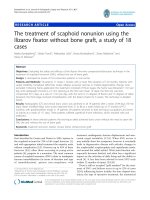The laughter of foxes, second edition a study of ted hughes (liverpool university press liverpool english texts studies
Bạn đang xem bản rút gọn của tài liệu. Xem và tải ngay bản đầy đủ của tài liệu tại đây (3.58 MB, 231 trang )
THE LAUGHTER OF FOXES
LIVERPOOL ENGLISH TEXTS AND STUDIES
General editors: JONATHAN BATE and BERNARD BEATTY
This long-established series has a primary emphasis on close reading, critical exegesis and textual scholarship. Studies of a wide range of works are
included, although the list has particular strengths in the Renaissance, and
in Romanticism and its continuations.
Byron and the Limits of Fiction edited by Bernard Beatty and Vincent
Newey. Volume 22. 1988. 304pp. ISBN 0-85323-026-9
Literature and Nationalism edited by Vincent Newey and Ann Thompson.
Volume 23. 1991. 296pp. ISBN 0-85323-057-9
Reading Rochester edited by Edward Burns. Volume 24. 1995. 240pp. ISBN
0-85323-038-2 (cased) 0-85323-309-8 (paper)
Thomas Gray: Contemporary Essays edited by W. B. Hutchings and William
Ruddick. Volume 25. 1993. 287pp. ISBN 0-85323-268-7
Nearly Too Much: The Poetry of J. H. Prynne by N. H. Reeve and Richard
Kerridge. Volume 26. 1995. 224pp. ISBN 0-85323-840-5 (cased) 085323-850-2 (paper)
A Quest for Home: Reading Robert Southey by Christopher J. P. Smith.
Volume 27. 1997. 256pp. ISBN 0-85323-511-2 (cased) 0-85323-521-X
(paper)
Outcasts from Eden: Ideas of Landscape in British Poetry since 1945 by
Edward Picot. Volume 28. 1997. 344pp. 0-85323-531-7 (cased) 0-85323541-4 (paper)
The Plays of Lord Byron edited by Robert F. Gleckner and Bernard Beatty.
Volume 29. 1997. 400pp. 0-85323-881-2 (cased) 0-85323-891-X (paper)
Sea-Mark: The Metaphorical Voyage, Spenser to Milton by Philip Edwards.
Volume 30. 1997. 227pp. 0-85323-512-0 (cased) 0-85323-522-8 (paper)
The New Poet: Novelty and Tradition in Spencer’s Complaints by Richard
Danson Brown. Volume 31. 1999. 304pp. 0-85323-803-0 (cased)
0-85323-8132-8 (paper)
THE LAUGHTER
OF FOXES
A Study of Ted Hughes
KEITH SAGAR
LIVERPOOL UNIVERSITY PRESS
First published 2000
Second revised edition
published 2006 by
LIVERPOOL UNIVERSITY PRESS
4 Cambridge Street, Liverpool L69 7ZU
Copyright © 2000, 2006 Keith Sagar
The right of Keith Sagar to be identified as the author of this book has
been asserted by him in accordance with the Copyright, Designs and
Patents Act, 1988
All rights reserved. No part of this book may be reproduced, stored in a
retrieval system, or transmitted in any form or by any means, electronic,
mechanical, photocopying, recording, or otherwise, without the prior
written permission of the publishers.
British Library Cataloguing-in-Publication Data
A British Library CIP Record is available for this book
ISBN 1-84631-011-3
ISBN-13 978-1-84631-011-9
Typeset by Northern Phototypesetting Co. Ltd, Bolton
Printed in Great Britain by
Bell & Bain Ltd, Glasgow
Contents
Epigraph
Preface
Acknowledgements
List of Abbreviations
A Timeline of Hughes’ Life and Work, by Ann Skea
vi
ix
xiii
xiv
xv
Chapter One The Mythic Imagination
1
Chapter Two From Prospero to Orpheus
36
Chapter Three The Evolution of ‘The Dove Came’
87
Chapter Four From World of Blood to World of Light 104
Appendix The Story of Crow
170
Select Bibliography
Index of Works by Ted Hughes
General Index
181
189
193
THE HEALER
by Mark Hinchliffe
For Ted Hughes – A Thanksgiving
1. Hearing your voice
awakened me,
unblocked my ears,
as if I had been underwater
up to that moment,
and suddenly surfaced
to an island of
wonderful sounds,
and now the fox
keeps walking out of
the darkness into my head.
2. A class of children,
held by The Iron Man,
acted the story.
One barely able to read,
who hardly spoke,
jumped on the desk
and switched the blackboard
light on and off
to be the Iron Man’s eyes.
He held chalk between his fingers,
and crawled around the floor
as he pieced himself together.
Later he wrote:
‘I aket as the Iron Man we had
the lit on and off then I fell off
vi
The Healer
the besg I had chars on top of
me it look riyel then I got
togeser a gen.
I lad in the fiver three tames
and the jogen lad in the sun
three tames he give in I wan.
I was singing in the sky’.
And Ariel sang to me,
Crouched on his shoulders.
3. At Lumb Bank
you read your journal poems
about sheep, lambs, cows,
ravens, death, births.
Persephone walked
across the room,
and sang into
my ear
of Spring’s return.
4. You stand over the pool,
draw pictures
with your staff.
you lift them out,
shimmering rainbows, mirrors
they are food and drink,
they are our parents,
our children.
the pictures change,
and we are changed.
A caged jaguar sends
his spirit into
vii
viii
The Healer
a dancing boy
who seeds the wasteland.
A burning fox melts
into the laughter of foxes.
You stand over the pool,
and every third thought
is healing
how to heal,
every third thought
is living,
how to live.
And you bury your books
deep into the body of England,
where they are carried
by rivers,
emerging again,
looking all around,
rubbing their eyes,
looking for places
to sink their roots,
like the piper’s lost children,
like leaves stretching
from a green head.
PREFACE
Ted Hughes is, I believe, the greatest British writer of the second half
of the twentieth century, and the latest addition to the great tradition
of Western Literature which includes, among many others, Homer,
the Greek tragic poets, Shakespeare, Blake, Wordsworth, Coleridge,
Keats, Whitman, Hopkins, Yeats, Lawrence, Eliot and the post-war
East European poets. In accordance with Eliot’s dictum that every
new great writer added to the tradition changes the tradition, Hughes
has changed the way we read all these writers, not only those on
whom he has actually written.
In the first chapter I try to describe the mythic nature of Hughes’
imagination, and to claim great importance for the healing power of
such imagination at the threshold of a new and dark millennium.
This seems to me necessary because criticism, before it can undertake
anything else (if there is anything else it is qualified to undertake),
must first reach the point of being able to actually read the work –
read it, that is, not in terms of some prior expectations or critical theory, but in terms of what we can divine of the author’s own inner idea
of what he or she is after. Every creative writer has a unique imaginative context, a matrix of psychologically or spiritually active imagery,
for example, and can write living poems only out of it. To become an
adequate reader one must approach the work, in Hughes’ words,
‘with the cooperative, imaginative attitude of a co-author’, enter as
deeply as one can the writer’s imaginative world. Otherwise it is time
wasted to read that author at all. Hughes’ imaginative world was
deeply mythic, in the sense of both drawing on the body of myth we
have inherited and spontaneously creating new myths, or new
expressions of the primal myths. This is the theme of my first
chapter.
Hughes began to receive in the last year of his life some long overdue recognition, in the form of glowing reviews, awards and massive
sales. Nevertheless, even in the obituaries, the media kept to their
own agenda, in which sex, suicide and guilt are far more interesting
ix
x
Preface
than poetry, so that the general impression built up by the media over
many years remained intact, that Hughes’ greatest claim to fame was
as the husband of Sylvia Plath. And the enormous amount of attention given to Birthday Letters showed little interest in what was at the
heart of that relationship, the deep commitment of both Hughes and
Plath to poetry: ‘we only did what poetry told us to do’. This is the
theme of the second chapter.
Like many other poets before him, Hughes fostered the half-truth
that great poems write themselves in a single draft, which cannot be
bettered. Though no doubt this does occasionally happen, and certainly happened occasionally for Hughes, the great majority of his
poems had to be worked at over many drafts, as his manuscripts reveal,
before he discovered what wanted to get itself expressed. In the third
chapter I try to show how this process worked with a fairly typical
Hughes poem, ‘The Dove Came’, from Adam and the Sacred Nine.
Ironically, the two works that received most of the belated acclaim,
Birthday Letters and Tales from Ovid, are not part of the main body of
Hughes’ achievement, since, splendid as they are of their kind, neither allowed Hughes the total imaginative freedom his greatest work
needed, each being Hughes’ treatment of already existing material,
whether Ovid’s tales or the already well-documented factual record of
his relationship with Sylvia Plath. In both works the plot was predetermined.
And by identifying the characters in Birthday Letters specifically as
Hughes and Plath, the poems inevitably cast the reader in the role of
voyeur, however deeply our sympathies might be engaged. Birthday
Letters sold ten times more copies than any other Hughes book in its
first year, not because it is ten times better as poetry but because there
are ten times as many voyeurs as poetry-lovers among book-buyers,
and a hundred times as many among newspaper editors.
Though Hughes, having begun by despising the confessional
mode in poetry, came to see it as of great value, particularly as autotherapy, the claim that Birthday Letters is the summit of his achievement is as absurd as it would be to claim that the sonnets (revelatory
as they are) are the pinnacle of Shakespeare’s. As Hughes said in the
Paris Review interview in 1995:
Preface
xi
Once you’ve contracted to write only the truth about yourself
– as in some respected kinds of modern verse, or as in Shakespeare’s sonnets – then you can too easily limit yourself to what
you imagine are the truths of the ego that claims your conscious
biography. Your own equivalent of what Shakespeare got into
his plays is simply foregone. (69–70)
Though there are wonderful poems from both before and after,
the body of work on which Hughes’ reputation should stand (his
equivalent of what Shakespeare got into his plays) is almost everything he wrote in the seventies and very early eighties – the poems
collected in Season Songs (1974), Cave Birds (1975), Gaudete (1977),
Remains of Elmet (1979), Moortown (1979) and River (1983). These
books contain the inestimable healing gifts which are Hughes’ legacy
to us all.
In a 1996 interview (Negev) Hughes said:
Every work of art stems from a wound in the soul of the artist.
When a person is hurt, his immune system comes into operation and the self-healing process takes place, mental and physical. Art is a psychological component of the auto-immune
system that gives expression to the healing process. That is why
great works of art make us feel good.
There are artists who concentrate on expressing the damage,
the blood, the mangled bones, the explosion of pain, in order
to rouse and shock the reader. And there are those who hardly
mention the circumstances of the wound, they are concerned
with the cure.
There are also artists who begin in the first group and painfully, marvellously, drag themselves into the second (though perhaps to discover, at the end, that some damage is incurable). In doing so they
are enacting, in their work, the classic quest myth. What Hughes said
of Plath’s work is equally true of his own: ‘The poems are chapters in
a mythology where the plot, seen as a whole and in retrospect, is
strong and clear’ (Faas 180). Nearly every poem from The Hawk in
the Rain to River is a station on the spiritual and poetic journey by
which Hughes, with many set-backs, many cul-de-sacs, arrived at last
xii
Preface
full circle from a world made of blood back to that same world now
seen, as a result of the journey with all its transfiguring pain, to be a
world made of light. This is the theme of the fourth chapter. The
journey ends with River. Though there are fine poems from the
remaining years, they are few in comparison with the outpouring of
the seventies, and to one side of the driving quest. After River Hughes
lapsed largely into prose and translations, putting his own imagination at the service of the imaginations of others – of Aeschylus and
Euripides, Ovid, Shakespeare, Racine, Coleridge, Pushkin,
Wedekind, Lorca, Eliot, Keith Douglas, William Golding, Leonard
Baskin and Marin Sorescu. Birthday Letters also stands apart. Hughes
came to feel that they were the poems he should perhaps have written, or tried to write, in the three-year silence after 1963. That they
took over 30 years to force themselves into utterance is its own
tragedy.
The Life and Songs of the Crow would undoubtedly have been one
of Hughes’ greatest works had that vast project not been aborted in
1969 following the second paralysing ‘explosion of pain’ in Hughes’
life. Crow itself is a gathering of what could be salvaged from the
debris. These fragments from the first two-thirds of the story have
been widely misinterpreted because readers lacked the necessary context of Crow’s quest, the ‘epic folk-tale’ in which Crow was to have
been transformed. Hughes came to regret not having provided this
essential framework in some form, and always gave chunks of it
whenever he read Crow poems. But he declined to publish this material until he gave me permission to do so in this book.
ACKNOWLEDGEMENTS
Hughes scholarship has been to date gratifyingly cooperative. During
the 20 years this book has been in the making, I have received help
of many kinds from more scholars than I can hope to name. It would
be invidious to try to establish any priority, so I shall list some of
them alphabetically: Nick Bishop, Roger Elkin, Colin Fraser, Nick
Gammage, Mark Hinchliff, Fred Rue Jacobs, Claas Kazzer, Terry
Gifford, Joanny Moulin, Colin Raw, Neil Roberts, Len Scigaj, Ann
Skea, Steve Tabor. I should also like to thank Olwyn Hughes and
Daniel Huws for the information they have generously supplied, and
to acknowledge the great deal I have learned from the many students
with whom I have studied Ted Hughes in adult classes.
‘The Genesis of “The Dove Came”’ is reprinted from The Challenge
of Ted Hughes, by kind permission of Macmillan. The reprinting of
the poem from the Rainbow Press edition of Adam and the Sacred
Nine is by kind permission of Olwyn Hughes. All quotations from
unpublished sources are by kind permission of Ted Hughes and the
Ted Hughes Estate.
xiii
ABBREVIATIONS
ABS
Australian Broadcasting Corporation
ATH
Keith Sagar, The Art of Ted Hughes, Cambridge University
Press, 1975
AS
Ann Skea
BBC TP
British Broadcasting Corporation Tape
BF
A. Stevenson, Bitter Fame, Viking, London, 1989
BS
Broadside
CUP
Cambridge University Press
DT
The Daily Telegraph
IOS
Independent on Sunday
KS
Keith Sagar
LE
Limited Edition
PBS
Poetry Book Society, London
PR
Paris Review, Interview, Spring 1995
SPJ
Hughes and McCullough (eds), The Journals of Sylvia
Plath, Ballantine, NY, 1991
SPLH
A. Plath (ed.), Sylvia Plath: Letters Home, Harper and
Row, NY, 1975
SW
J. Malcolm, The Silent Woman, Picador, London, 1994
TH
Ted Hughes
UU
E. Faas, The Unaccommodated Universe, Black Sparrow,
Santa Barbara, 1980
WP
T. Hughes, Winter Pollen, Faber, London, 1994
xiv
A TIMELINE OF HUGHES’ LIFE AND WORK
by Ann Skea
This list of Ted Hughes’ publications, life events and interests is not
comprehensive. It was compiled from books, newspaper articles,
recordings, letters and notes to give an overview of important and
formative influences that have helped to shape his work. It also
suggests the date at which some of his works originated.
It is best used in conjunction with K. Sagar and S. Tabor, Ted Hughes:
A Bibliography, 1946–1995, 2nd edn, Mansell, London, 1998.
1930
Born 17 August, Mytholmroyd, Yorkshire, to William Henry and
Edith (née Farrar) Hughes. Sister (Olwyn) two years older; brother
(Gerald) ‘was ten years older than me and made my early life a kind
of paradise … which was ended abruptly by the war’ (Letter to AS,
November 1982, re. ‘Two’).
‘My first six years shaped everything’ (Interview, DT, 2 November
1998).
1937
Family moves to Mexborough, South Yorkshire. Owns a newspaper
and tobacco shop.
1943
Begins at Mexborough Grammar School.
1945
First poems written. ‘Zulus and the Wild West … All in imitation of
Kipling’ (UU 20).
1946
First poems and prose pieces published in school magazine, The Don
and Dearne. Pseudonym: Eeple Jote Hyewze. An essay, ‘Harvesting’,
xvi
A Timeline of Hughes’ Life and Work
contains seeds of later story, ‘The Harvesting’.
Influenced by folk-tales, Shakespeare, Yeats, Hopkins, Virgil, Eliot,
the ‘very different rhythms of the King James Bible’ (WP 5–6).
1948
Wins open exhibition to Pembroke College, Cambridge.
1949
Writes ‘Song’. ‘“Song” came to me as such things should in your
nineteenth year – literally a voice in the air at about 3.00 A.M. …’
(PR 11). Begins two years of national (military) service. Stationed at
a remote radar station at Fylingdales where he had nothing to do but
read and reread Shakespeare and watch the grass grow. ‘He literally
knows Shakespeare by heart’ (SPLH, 2 August 1956).
1951
Enters Pembroke to read English. ‘I spent most of my time reading folklore and Yeats’s poems’ (UU 56). ‘Beethoven’s music was my
therapy’ (PR 85).
1952
Family returns to West Yorkshire to live at The Beacon, Heptonstall
Slack.
1953
Fox dream. Drops English to study archaeology and anthropology
(WP 8–9).
A Timeline of Hughes’ Life and Work
Publications (major
publications in bold)
Work in progress, events,
interests and influences
1954
‘The Little Boys and the Seasons’
(Granta) – pseudonym Daniel Hearing.
‘Song of the Sorry Lovers’ (Chequer) –
pseudonym Peter Crew. ‘The Jaguar’ /
‘The Casualty’ (Chequer).
Graduates from Cambridge. Writes
‘The Conversion of the Reverend
Skinner’, ‘The Hag’, ‘Law in the
Country of the Cats’.
1955
‘The Woman with Such High Heels’
(Delta). ‘Comment on Chequer’
(review – pseudonym Jonathan Dyce).
1956
Many Hawk in the Rain poems
published, including ‘Fallgrief ’s
Girlfriends’, and the poems that were
to become ‘Law in the Country of the
Cats’, ‘Secretary’ and ‘Soliloquy of a
Misanthrope’, in the St Botolph’s
Review.
xvii
Living in London (Rugby St.) and
Cambridge. Rose gardener, nightwatchman, zoo attendant, schoolteacher, reader for J. Arthur
Rank. Planning to teach in Spain then
emigrate to Australia (SPLH, 4 May).
Reads a Penguin of American Poets
‘that started me writing’, ‘infatuated
with John Crowe Ransom’ (UU 210).
Writes ‘The Thought-Fox’, ‘Secretary’,
‘Soliloquy of a Misanthrope’, ‘BilletDoux’, ‘Fallgrief ’s Girlfriends’, ‘Two
Phases’, ‘The Decay of Vanity’,
‘Childbirth’ and ‘Wind’ (1955–6).
26 February – Launch of St Botolph’s
Review. Meets Sylvia Plath.
25 March – Second meeting with Sylvia.
16 June – Marries Sylvia Plath at St
George the Martyr’s Church,
Bloomsbury.
June/July – In Spain. Writing animal
fables. (SPJ, ‘Benidorm’).
August – To Heptonstall.
31 August – To Top Withens
(‘Wuthering Heights’).
September – Audition for BBC poetry
readings (SPLH, 28 September).
10 October – To London for BBC
reading of Yeats’s poems. Misses Sylvia
at station (SPLH, 16 October;
Birthday Letters, ‘Fate Playing’).
xviii
A Timeline of Hughes’ Life and Work
November – Living in Cambridge (55
Eltisley Ave.). Teaching English and
drama at local secondary modern
school. Sylvia Plath types out and
submits The Hawk in the Rain to
Harper’s competition: ‘I don’t see how
they can help but accept this; it’s the
most rich and powerful work since
Yeats and Dylan Thomas’ (SPLH, 21
November). Astrology, horoscopes,
hypnotism, tarot and experimenting
with Ouija board. (SPLH, 28
October).
1957
Many Hawk in the Rain poems
published.
April – ‘O’Kelly’s Angel’ (story)
(Granta). May – ‘Bartholemew Pygge
Esquire’ (story) (Granta).
August – First Lupercal poem
published: ‘Dream of Horses’ (Grecourt
Review). September – The Hawk in
the Rain. December – ‘Everyman’s
Odyssey’ (Landmarks and Voyages).
1958
Many Lupercal poems published
‘invocations to writing’, ‘a deliberate
effort to find a simple concrete
language’ (UU 209).
February – The Hawk in the Rain wins
Harper publication contest. Pan and
Ouija board (SPLH, 8 February).
Snatchcraftington, alphabetical fables
(SPLH, 24 February). Writes ‘View of
a Pig’, ‘Quest’ and ‘Thrushes’ at Eltisley
Ave. April – BBC reading (1 poem).
May – Hears Robert Frost reading at
Cambridge (SPLH, 24 May). June – To
Yorkshire. Then to USA (Wellesley
then Cape Cod). August – To
Northampton (337 Elm St.). Sylvia
teaching at Smith College. Meets Bill
and Dido Merwin.
Spring – Teaching at Amherst,
University of Massachusetts. 11 April –
Poetry reading at Harvard (SPLH, 22
April). 4 May – Meets Baskins
(Leonard and Esther). May – Reading
Creon in Paul Roche’s Oedipus trans. at
Smith (SPJ, 19 May). June – Six
Lupercal poems recorded in USA. Rents
flat in Boston (Willow St., Beacon
Hill). July – Summons Pan with Ouija
board (SPJ, 4 July; SPLH, 5 July).
August – BBC (6 Lupercal poems).
December – Making wolf mask (SPJ,
28 December). Guinness Poetry Award.
A Timeline of Hughes’ Life and Work
1959
Pike (BS) (LE 50). Many Lupercal
poems published. Reviews: Weekend in
Dinlock, Segal.
1960
March – Lupercal. ‘The Caning’, ‘Very
fine, very difficult’ (SPJ, 15
November), ‘The Rainhorse’, ‘Sunday’,
‘Snow’, ‘The Harvesting’ (stories).
xix
April – Awarded Guggenheim
fellowship (SPJ, 23 April). Summer –
Touring N. America by car. Had been
pursuing Cabalistic and Hermetic
interests for some time (UU 41).
Doing ‘exercises in meditation and
invocation … [from] magic literature’
(UU 210).
September – Yaddo Artists’ Colony for
11 weeks. Writes ‘Things Present’, the
last of the Lupercal poems. Meets Chou
Wen-Chung, agrees to collaborate on
Bardo Thodol. October – Writes House
of Taurus (scrapped) ‘symbolic drama
based on the Euripides play The
Bacchae’ (SPLH, 7 October). Precursor
to Gaudete (ATH 186–7).
November – Revising Meet My Folks
(SPJ, 1 November)
December – Returns to England
(Heptonstall).
Writing Recklings and Wodwo poems
and radio plays. Writing and rewriting
Bardo Thodol libretto (unperformed).
Setting: Chou Wen-Chung. Dreams of
The Wound action and text (ABC
interview, 1976).
February – Move to London (3
Chalcot Sq., Primrose Hill). Reading at
Oxford Poetry Society (BF 184).
March – Using Merwins’ study. The
Hawk in the Rain wins Somerset
Maugham award (SPLH, 24 March).
Lupercal wins Hawthornden Prize
(SPLH, 27 March).
1 April – Frieda Rebecca born.
April – Dinner at T.S. Eliot’s (SPLH,
26 April) ‘one of the very great poets.
One of the few’ (PR 73).
May – Meets Alan Sillitoe and his wife,
Ruth Fainlight (BF 213).
xx
A Timeline of Hughes’ Life and Work
June – Cocktail party at Fabers.
Photograph with Faber Poets (SPLH,
24 June), ‘Duk-dam charm to call fools
in a circle’ (ABC interview, 1976).
BBC accepts House of Aries (SPLH, 9
July). BBC – plays, stories and talks.
1961
March – Dully Gumption’s College
Courses. ‘Theology’, ‘a more
concentrated and natural kind of
poetry’ (UU 211).
April – Meet my Folks. August –
Pamphlets for BBC broadcasts
Listening and Writing. Autumn – ‘Miss
Mambrett and the Wet Cellar’ (story).
Reviews: Lochness Monster, Dinsdale;
Living Free, Adamson; The Cat in the
Hat Comes Back, Seuss; Barnaby and
the Horses, Pender; Timba, Gringolo,
Koenig.
1962
April – Leonard Baskin (Introduction).
May- Selected Poems with Thom Gunn.
June – ‘The Poetry of Keith Douglas’
(essay). Introductions: The Little Prince,
St Exupéry; Tarka the Otter,
Williamson; The Worst Journey in the
World, Cherry-Garrard. Reviews: The
Nerve of Some Animals, Froman; Man
and Dolphin, Lilly; Primitive Song,
Bowra; One Fish Two Fish, Seuss; The
Cat’s Opera, Dillon; The Otter’s Tale,
Maxwell; Animals of the Forest, Vérité;
Close-up of a Honeybee, Foster; Oddities
of Animal Life, Roberts; Imitations,
Lowell; Anthology of W. African Folklore,
Jablow; Everyman’s Ark, Johnson;
Here Come the Elephants, Goudey.
January – Thom Gunn to dinner
(SPLH, 1 January).
February – Sylvia Plath miscarries.
July – Reading (Poetry at the Mermaid,
London).
August – ‘The Wound’ written, ‘a
Celtic-Gothic Bardo Thodol’ (ABC
interview, 1976). Sells lease on London
flat to Wevills. Move to Devon (Court
Green).
November – BBC, The Odyssey, ‘The
Storm’ Book V (translation of Homer);
The House of Aries (play produced).
BBC – interview, talk, poems, school
broadcasts. Selector for Poetry Book
Society Choice.
Gaudete – begun as a film script (UU
123). The Chemical Wedding of
Christian Rosencreutz, Andreas: ‘for over
a year [this] became my prime source
of inspiration’ (BBC TP, 21 January
1963).
17 January – Nicholas Farrar born.
February – BBC, The Wound (play
produced). Interest in shamanic
dismemberment, Bacchae and Orphic
myths (BF 320). Reading Nietzsche.
May – Wevills visit. Selling Daffodils
(SPLH 14 May).
June – Beekeeping (SPLH 15 June).
July – Reading for Critical Quarterly,
Bangor, Wales (BF 251). BBC – school
broadcasts, talk, poems, stories.
September – Ted and Sylvia agree to a
separation. Ted moves to London.
A Timeline of Hughes’ Life and Work
1963
January – Here Today, (introduction).
May – Five American Poets (ed.).
September – ‘The Rock’, (The Listener);
‘The Poetry of Keith Douglas’ (essay).
October – ‘Ten Poems by Sylvia Plath’
(introduction). November – How the
Whale Became (fables); The EarthOwl and other Moon People; ‘The Rat
Under the Bowler’ (essay). Reviews: I
Said the Sparrow, West; The World of
Men, Baldwin; Rule and Energy, Press;
Vagrancy, O’Connor; Emily Dickinson’s
Poetry, Anderson; Folktales of Japan,
Seki; Folktales of Israel, Noy.
1964
January – ‘The Howling of Wolves’.
February – Selected Poems, Keith
Douglas (ed.): (introduction).
March – ‘The Suitor’ (story).
April – Nessie the Mannerless
Monster; ‘Dice’ (poem in 8 parts).
Reviews: Voss, White; Myth and
Religion of the North, Turville-Petre;
The Collected Poems of Wilfred Owen,
Day Lewis; Selections of African Prose,
Whiteley; The Heroic Recitations of the
Bahima of Ankole, Morris; Somali
Poetry, Andrzejewski and Lewis; The
Three Christs of Ypsilanti, Rokeach;
Letters of Alexander Pushkin, Shaw;
Astrology, MacNeice; Ghost and
Divining-rod, Lethbridge; Shamanism,
Eliade; The Sufis, Shah (probably
written in 1962, see BF 320);
Mysterious Senses, Dröscher;
Heimskringla, The Prose Edda, Sturlson;
Gods, Demons and Others, Narayan.
1965
January – ‘Sylvia Plath’ (note on Ariel).
March – Ariel, Sylvia Plath (ed.).
xxi
January – BBC, Difficulties of a
Bridegroom (play produced), based on
The Chemical Wedding of Christian
Rosencreutz, ‘words, music and pictures
… the interest is in imagery and mood’
(BBC TP, 17 October 1965); ‘a tribal
dream’ (UU 212). February – Sylvia
Plath dies. Writes ‘The Howling of
Wolves’. March – Writes ‘Song of a
Rat’. September – BBC, ‘The Rock’
(talk). BBC – interviews, poems, talks.
Awarded lecturer’s salary at University
of Vienna for 5 years, by Abraham
Woursell Foundation (PR 62).
February – BBC, Dogs: A Scherzo (play
produced). Gaudete film scenario
written. Writing Eat Crow (UU 212).
November/December – BBC, The
Coming of the Kings (play produced).
March 3 – Alexandra Tatiana Eloise
(Shura) Wevill born
xxii
A Timeline of Hughes’ Life and Work
April – ‘The Genius of Isaac Bashevis
Singer’ (essay).
June – Eat Crow (play) (parts of
Difficulties of a Bridegroom); Modern
Poetry in Translation (editorial). Autumn
– ‘The Tiger’s Bones’ (play); ‘Beauty
and the Beast’ (play). Reviews: Faber
Book of Ballads, Hodgart; Men who
Marched Away, Parsons; Literature
Among the Primitives, The Primitive
Reader, Greenaway.
1966
Summer – ‘Vasco Popa’ (essay).
Autumn – ‘On the Chronological
Order of Plath’s Poems’ (notes).
October – The Burning of the Brothel
(LE 300). Reviews: Dylan Thomas
Letters, Fitzgibbon.
1967
January – Recklings (LE 150).
April – Scapegoats and Rabies (LE 400).
May – Wodwo ‘a descent into
destruction of some sort’ (UU 205).
August – Animal Poems (LE 100).
December – Poetry in the Making
(broadcasts); ‘Gravestones’ (BS) (LE
40). First Crow poems published:
‘Three Legends’, ‘A Battle’, ‘Lovesong’.
1968
February – The Iron Man (story): ‘I
just wrote it out as I told it over two or
three nights’ (IOS, 5 September 1993)
March – A Choice of Emily Dickinson’s
Verse (introduction). July – Yehuda
Amichai: Selected Poems (collaborated
on trans.); Beauty and the Beast (play).
December – Many Crow poems
published. Five Autumn Songs (LE
500). Reviews: Folk-tales of Chile,
Dawson; Hindoo Fairy Tales, Frere; The
Helps to organize the first big Arts
Council International Poetry Festival.
Reading with Auden and Neruda (PR
73). September – BBC, ‘The House of
Donkeys’ (re-telling of Japanese folktale). Reads 3 poems at Edinburgh
Festival. October – BBC, reading
‘Ghost Crabs’, ‘Waking’, ‘Gog III’ from
play Difficulties of a Bridegroom.
November/December – BBC, The
Tiger’s Bones; Beauty and the Beast (plays
produced). BBC – poetry readings, talks.
Crow poems begun at request of
Baskin to accompany drawings, ‘the
way I wrote … when I was about
nineteen’ (UU 121).
September – BBC, The Price of a Bride
(play produced). BBC – poetry
reading, talks.
July – BBC Poetry International ’67
(speaking and reading; broadsheet and
programme notes). September/October
– BBC, The Head of Gold (play
produced).
19 March – adaptation of Seneca’s
Oedipus performed (Old Vic):
‘concentrated my writing … useful in
Crow’ (UU 212). March – The Demon
of Adachigahara (libretto), setting by
Crosse, performed at Shrewsbury. May
– BBC, Sean, the Fool, the Devil and the
Cats (play produced); Five Autumn
Songs written for and read at Harvest
Festival, Little Missenden. Autumn –
Reading poetry at Peacock Theatre,
A Timeline of Hughes’ Life and Work
Glass Man and the Golden Bird,
Manning-Sanders; The Black Monkey,
Hampden.
1969
February – Vasco Popa: Selected Poems
(introduction). December – Seneca’s
Oedipus (adaptation). Many Crow
poems published.
1970
January – ‘The Chronological Order of
Sylvia Plath’s Poems’ (note in The Art of
Sylvia Plath). March – The Martyrdom
of Bishop Farrar (LE 100); ‘Myth and
Education’ I (US publication) (essay);
A Crow Hymn (LE 100).
August – ‘Four Crow Poems’ (BS) (LE
20).
September – The Coming of the
Kings (4 plays). October – Crow:
from the Life and Songs of the
Crow; A Few Crows (LE 75); Amulet
(LE 1); ‘Fighting for Jerusalem’ (BS)
(LE 1); The Tiger’s Bones (play); The
House of Donkeys (part of the play);
Interview with Ekbert Faas (UU
197–208). Reviews: Children’s Games in
Street and Playground, Opie; The
Environmental Revolution, Nicholson,
The God Beneath the Sea,
Garfield/Blishen; The Book of
Imaginary Beings, Borges.
xxiii
Dublin. BBC – poetry and playreadings. The Arvon Foundation
established by John Fairfax and John
Moat: ‘I thought the scheme was
unworkable’. Involved with first course
in Devon and was converted (Letter to
AS, August. 1993).
February – The New World songs
commissioned (performed in 1972).
March – Househunting with Assia on
Tyneside. Last Crow poem, ‘A Horrible
Religious Error’, written on train from
Manchester after first televised reading.
Death of Assia and Shura. Co-director
of Poetry International. The Battle of
Aughrim recorded. Death of Hughes’
mother. Awarded City of Florence
International Poetry Prize.
May – Poetry D-Day (reading at the
Roundhouse).
August – Marries Carol Orchard.
September – Settings of two poems
performed at the Edinburgh festival:
‘King of Carrion’, ‘Eros’. November –
Reads from Crow at ICA. BBC –
poetry readings, talks.
xxiv
A Timeline of Hughes’ Life and Work
1971
March – Shakespeare’s Poem (LE 150).
April – Crow Wakes (LE 200); Poems
with Ruth Fainlight and Alan Sillitoe;
Autumn Song (poster) [‘Who Killed
the Leaves?’]; ‘The Poetry of Ted
Hughes’ (sheets) (LE). May – Fiesta
Melons, Plath (introduction) (LE 150);
Crossing the Water, Plath (ed.); Orpheus
(verse play).
September – Winter Trees, Plath (ed.)
(note).
November – Eat Crow (LE 150); With
Fairest Flowers While Summer Lasts:
Poems from Shakespeare (ed.)
(introduction) (LE 140); A Choice of
Shakespeare’s Verse (introduction). First
formulation of the ‘Tragic Equation’.
1972
February – Sunday (story from Wodwo,
separate publication by CUP).
September – The Coming of the Kings
(script).
October – Selected Poems 1957–67; ‘In
the Little Girl’s Angel Gaze’ (BS) (LE
50).
November – Orghast at Persepolis,
Smith (excerpts from play; ideas,
language and myth); Works in Progress 5
(Faas interview). Reviews: A Separate
Reality, Castaneda.
1973
July – Orpheus (play).
November – Prometheus on his Crag
(LE 160); Stones: Poems by Paul
Merchant (introduction) (LE 150).
1974
February – The Story of Vasco (libretto).
July – Sean, the Fool, the Devil and the
Cats (script); Beauty and the Beast
January – BBC, Orpheus (play
performed). Olwyn Hughes founds
Rainbow Press. Begins to look again at
Gaudete material. The underworld, the
‘most interesting part’ of story
narrative, ‘trimmed itself down’ (UU
214).
May/September – Accompanies Peter
Brook to Shiraz Festival, Persia. Orghast
performed: ‘we orchestrated the sounds’
(ABC interview, 1976). The Conference
of the Birds: ‘I wrote about 100 poems
and scenarios for Peter Brook’s
company to improvise with’
(Conversation with AS, 1995).
November – Reads at Manchester
Poetry Centre.
August/September – ‘The New World’
(libretto), setting by Crosse, performed
at the Three Choirs Festival
(Worcester). Buys Moortown Farm (95
acres) and runs it with Carol and her
father, Jack Orchard, who had owned a
farm near Crediton (Conversation with
AS, 1995).
October – ‘Overwhelmed afresh’
reading new Penguin selection of D.H.
Lawrence’s poems (Letter to KS).
December – BBC TV, The Iron Man
read.
March – The Story of Vasco performed
(Sadler’s Wells). April – Reads at
Shakespeare Birthday Celebrations,
Southwark. Awarded Premio Internazionale Taormina Prize.
Sees Baskin bird-drawings. Begins bird
drama, Cave Birds: ‘my starting point
was the death of Socrates [and his]
